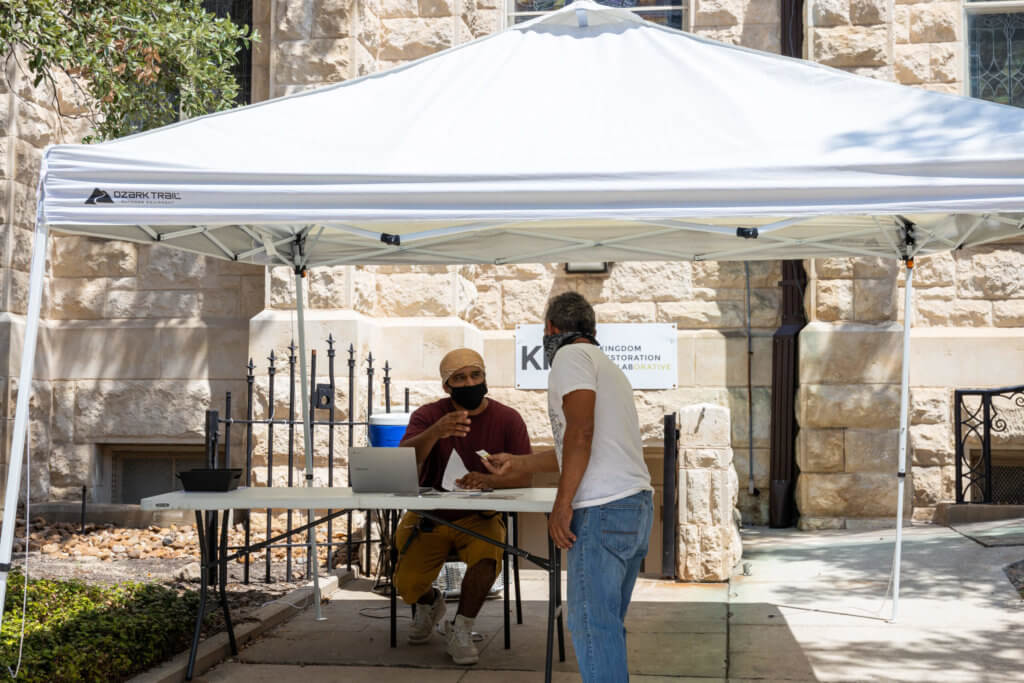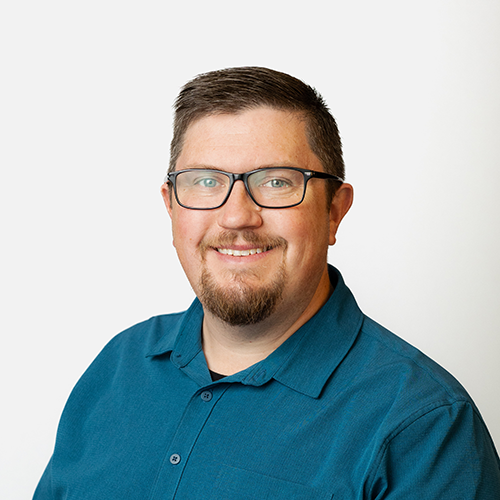Partnerships Re-Purpose Space and Re-Ignite Hope
How does a father struggling not to lose custody of his children become a key staff member in a Christian ministry? Ultimately, change comes through the transforming power of Jesus Christ. As Chris Parker says, though, God used many different people (case workers, ministry volunteers, etc.) to show Jesus’ power to him. “At the time in my life when I was sure the world was out to keep me under and destroy me, [they] gave me hope, a sense of security, and a sound mind,” he says.
Chris’s story is part of the fruit of a long process of transformation that has brought churches, nonprofits, and even government services together to show the love of Christ in a community.
Partnerships for Shared Purpose
San Antonio, Texas, is a vibrant, multi-ethnic city and popular tourist destination. In 2019, it also had the highest poverty rate among the 25 largest metro areas in the United States, and nearly 3,000 homeless individuals. One historic downtown church and a local ministry have partnered together to change that narrative and to deeply engage with people experiencing the worst of material poverty in their city.
First Presbyterian Church of San Antonio (FPC) is located in between a revitalizing city center, renowned for its restaurants and tourist attractions, and the second-lowest-income ZIP code in this sprawling city. Thanks to this location, many of the church’s neighbors are wrestling with long-term poverty and homelessness.
Mitchell Moore, an associate pastor at FPC, says that the church is experiencing a renewed determination to demonstrate God’s love to its neighbors and neighborhood in word and in deed. Through this, they’ve begun to see people from backgrounds of deep poverty come into relationship with the church, sometimes with situations that require deeper help than the church can provide on its own. Moore explains, “FPC realized we needed a higher level of expertise to more holistically love our neighbors. That’s when we turned to SA Hope Center.”
SA Hope Center (SAHC) Executive Director Megan Legacy describes the ministry’s work as “focused on building trust, identifying the barriers each person or family faces, and working towards removing barriers by building off the unique strengths of those in our programs, helping them get equipped for long-term stability and wellness.” Though SAHC was founded to address emergency hunger needs of the community, in 2012 they began a shift toward a relationship-based approach. Today, SAHC works through case management, workforce readiness, financial literacy, referrals to long-term housing, mental health and healthcare, education, and many other services to address long-term brokenness in the community.
“The SA Hope Center is set apart by the relational and dignifying approach through which they care for families and individuals struggling in poverty,” Pastor Moore explains. Through FPC’s relationship with SAHC, the church began dreaming of a “win-win” partnership. Could SAHC expand in a non-traditional capacity through using space at the church for their social workers? Could the church bring a needed aspect of care for the homeless and materially poor in San Antonio through empowering SAHC social workers to extend their influence downtown?
Kingdom Restoration Lab
This partnership came to fruition in FPC’s Kingdom Restoration Lab (KRL) in 2019, a step of faith to steward their campus to empower organizations and collaboration to holistically care for and empower their neighbors wrestling with chronic material poverty and homelessness.
“Many organizations focus on ’emergency room’ care for the poor—food aid, short-term shelter, and one-time subsidies. Others in the city provide holistic, long-term care, but they are stretched to capacity,” Pastor Moore says. The KRL is providing needed leadership in collaboration among various organizations. Because material poverty and homelessness have multi-faceted causes, the partner organizations in KRL seek to provide multi-faceted approaches to serving the community—offering women’s health services (including prenatal care), mental health services, support for underage mothers, substance abuse recovery groups, jobs-preparedness training. Through all these ministries, the KRL and its partners seek to take a participatory approach to ministry aimed at re-establishing social networks. Moore says that social workers from SAHC are “a backbone of the work of the KRL, anchoring all the organizations and churches who see the KRL as a place through which to love downtown and the East Side.”

SAHC Director Megan Legacy says that this place is crucial, especially for those experiencing homelessness. “An unsheltered person in San Antonio (someone who, for a variety of reasons is not residing in a local shelter) has very limited or no access to case management, help with housing referrals, workforce development,” she said. “The KRL provides a dignified and safe place to receive these services outside of a shelter environment, helping individuals struggling with homelessness to secure employment and permanent housing.”
Helping Without Hurting
By God’s grace, the principles and practices we teach at the Chalmers Center had a hand in this work as well. Legacy explains, “In 2014, we fully transitioned our model from a feeding ministry to one that aims to developmentally address the causes of generational and systemic poverty. Our entire staff read When Helping Hurts and we watched the video series to guide the spirit behind our changes and work.” One of the biggest takeaways her team experienced was the book’s teaching on the process of change management—when an agency provides handouts for many years, to make shifts to workforce development, goal-setting, and financial empowerment is painful.
“It was very empowering for the staff, board, and volunteers to learn from the Chalmers Center,” she says, citing When Helping Hurts as a guide for the changes and growth SAHC has seen over the past several years. “I think there was an attitude that Christians should just give food away. I argue that true compassion is caring about someone’s future,” she explains. “Our organization’s mantra is hope for today, tomorrow, and eternity.”
Pastor Moore shares that FPC also trains all their ministry volunteers using the books Becoming Whole and A Field Guide to Becoming Whole. Karen McCulloch, who leads volunteers at the KRL, says these provide a necessary foundation, “because we are all ‘fixers!’ We all want to give out stuff, but we are learning that what we do here is God’s story, not ours.”
Sharing Hope
Now we begin to see how what God had been doing to stir up His people for partnership worked out in Christ’s life.
When he and his wife April first sought services at SAHC in 2015, they had 6 children, two of whom had special needs. Chris was working hard to obtain full custody of his children, taking court-ordered parenting classes through SAHC. In addition to completing parenting classes, Chris and April received help with job readiness, financial literacy, and case management (a relationship-based social work program). They finished the program, obtained better jobs, were successfully awarded custody of their children, found a great home for their family, and Chris even started his own landscaping business.
In the midst of this process, they gave their lives to Christ and began volunteering and bringing others to SAHC. In 2020, Chris joined the team at the KRL as a security host—someone who understands what it is like to need help who can passionately minister to those on the streets as a living example of hope.
Pastor Moore says that this is much more than a job for Chris, who has a deep burden to minister to our downtown neighbors, and testifies to the work of God in his life: “The other day, a man came through who was both anxious and excited to have a fresh direction. He asked for prayer. Chris texted me to come down and pray, but then asked me not to, as he felt the Spirit leading him to pray for our neighbor. Chris did and said he felt a renewed sense of call to care for people, freshly empowered.”
Mutual Transformation
Moreover, the transformation of ministry and interaction with their neighbors through the KRL has impacted those serving as much as those who are receiving help. Pastor Moore says that First Presbyterian has been revived by this partnership.
Lead Volunteer McCulloch says “In all my relationships, both past and present. Christ is continuing to mold me into whom I’m called to be. One time, a client came in, speaking rudely, as I checked him in. After his session, he came back and apologized. I stood up and said, ‘It’s OK. We’re all broken!’ That’s the Holy Spirit.”
Chair of local missions at the KRL Teresa McCaleb shares how she has learned to love ministry participants “just as I would any dear friend.” With one particular participant, Gina, she’s become so close that she will answer texts in the middle of the night, take her to the hospital and sit with her there. McCaleb says, “I don’t do this just because we are called to love our neighbor; I do this because we have a real relationship. She trusts me (which is huge in this context) and I love and care for her. And it isn’t a one-way relationship. I share my brokenness with her, as well, and she loves me, always asking how I am and how my loved ones are doing.”
Looking Ahead
In July 2020, the work of the KRL came to the attention of the Texas Department of Housing and Community Affairs who provided a grant of $340,000 to SAHC to empower their work there, without restricting the Christ-centered nature of the ministry. The grant was $100,000 more than they applied for because of “the demonstrated capacity to handle a larger project and to ensure that dollars are funneled into rapid rehousing quickly, our community’s current top priority.” Pastor Moore said, “This grant is fruit of innovative, collaborative kingdom partnership and a window into the impact the church can have when we creatively and intentionally steward space for ministry.”
Legacy said that the state grant is specifically to hire two social work housing specialists and provide funds for permanent housing assistance as participants are able to transition from the streets into employment. It will allow them to save some of their earnings for several months so they won’t be month-to-month and have a plan for the future. The grant allows SAHC to expand their existing programs and goals at the KRL, not forcing them to jump through hoops or stretch to add unplanned activities as a condition of the funding.
Pastor Moore hopes other churches and organizations can follow a similar model of collaborative community ministry. “Churches often have great resources, a ‘Joseph’s storehouse’ worth of physical space, community influence, and monetary savings,” Moore said. “We must respond to God’s grace through innovatively and faithfully stewarding all God has given.”
Moore sums it up well:
“Could you imagine if churches opened our doors to trusted partners who can empower our love for both neighbors and the neighborhood? Imagine if churches opened space to children without access to the Internet but needing to study online or opened space for classes for financial health like Faith & Finances? What if churches provided needed relational and influence capital for teen moms, mental health ministries, or job readiness programs? When the church commits to open doors, stewarding space for collaborative kingdom advancement, then other resources follow—relationships, connections, influence, time, talents, and the doors of hearts are opened. I choose to believe the promises of Isaiah 58, especially that when we care for the afflicted our healing will speed up quickly and our light will break forth like the dawn. The promises of God for the people of God are true!”


